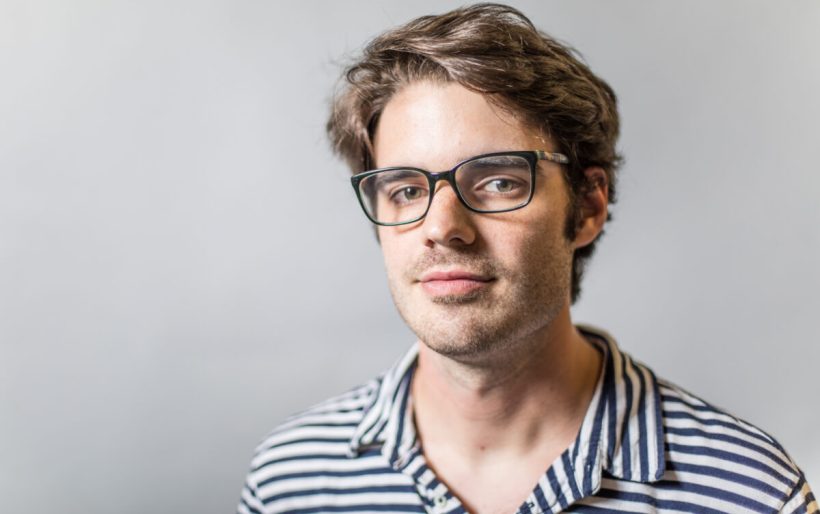
Jake Ewald | photo by Josh Pelta-Heller for WXPN
The High Key Portrait Series: Jake Ewald of Slaughter Beach, Dog
“High Key” is a series of profiles conceived with the intent to tell the story of Philly’s diverse musical legacy by spotlighting individual artists in portrait photography, as well as with an interview focusing on the artist’s experience living, creating, and performing in this city. “High Key” will be featured in biweekly installments, as the series seeks to spotlight artists both individually and within the context of his or her respective group or artistic collective.
Jake Ewald would position the dissolution of beloved hometown heroes Modern Baseball more as an indefinite hiatus. One of the most heralded band of recent Philly history, MoBo played three sold-out goodbye-for-now sets at Union Transfer last Fall. Just before that, the below interview was recorded backstage at the inaugural Philadelphia Music Fest, where Ewald played a set with his new project, Slaughter Beach, Dog.
In the time since, Ewald has kept busy touring behind and gigging locally in support of Birdie, the second full-length for that band, and confounding music writers everywhere with Slaughter Beach, Dog’s unanticipated comma. The band trades pop-punk for a more acoustic-centered approach to Ewald’s unique brand of storytelling, and was recorded at his Fishtown studio The Metal Shop, a setup asselmbed with fellow MoBo-er Ian Farmer and Sorority Noise’s Cameron Boucher over the past four or five years, in a space he found on Craigslist. In this interview, we got Ewald’s perspective on straddling the space between one band winding down and another winding up, the scene that he discovered upon moving to Philly six years ago, and the ups and downs of different neighborhoods.
Explore more by reading on, and catch Slaughter Beach, Dog playing a gig on the 23rd of this month, at West Philly spot Hole Foods.
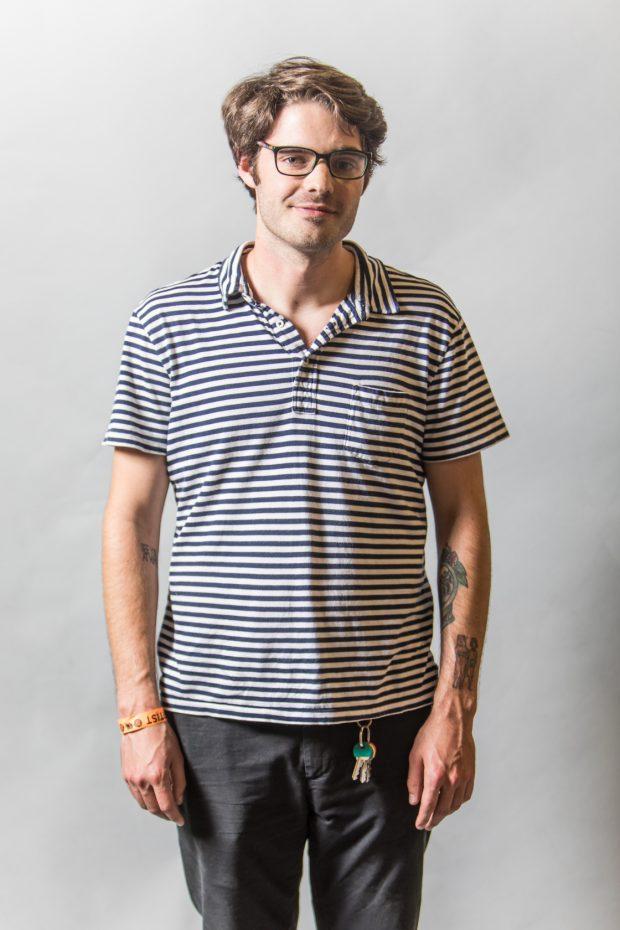
Jake Ewald | photo by Josh Pelta-Heller for WXPN
THE KEY: Are you native to Philly?
JAKE EWALD: I grew up in Maryland, in a town called Frederick, and then I came to Philly for college, and have not left since then. That was six years ago.
TK: So you graduated, what, two years ago then?
JE: Sounds about right. It was kinda confusing, because I was in a band that was on tour all the time, and we would take off school for little chunks, so it took longer than it was supposed to. But yeah it’s been like two years, no-school, just regular living…
TK: That band was… Modern Baseball…
JE: Modern Baseball, yeah.
TK: So you guys are wrapping that up?
JE: Yeah we did way too much all at once, and got really burnt out. [laughs] So we ended up canceling a tour earlier this year, but we’re doing a couple of shows in October just as kind of like a “sorry for canceling that tour!,” and then we’re gonna take it easy for a long time. Kinda just see when we wanna pick it up again.
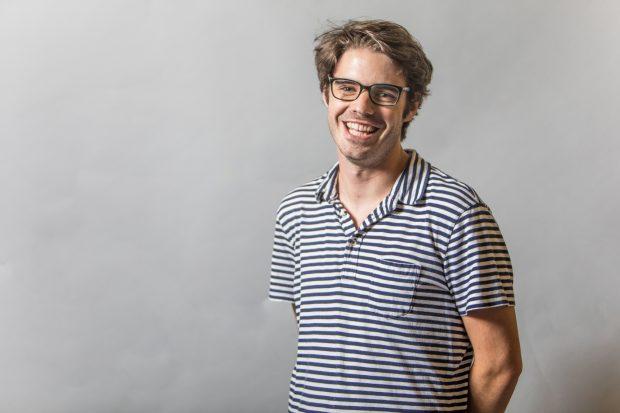
Jake Ewald | photo by Josh Pelta-Heller for WXPN
TK: The new project has none of the same members?
JE: Actually the bass player is also in this band, [playing] bass.
TK: In your words, how is it different?
JE: I don’t know. I guess it’s a little more.. it’s less rockin’. It’s a little more reserved. A lotta the stuff is more restrained, which is kinda just a product of the kind of music that I started listening to, later in Modern Baseball. Yeah, it’s just kinda more restrained and less crazy, and just kinda save the crazy stuff for little chunks.
TK: What do you remember personally from your first show playing in a Philly venue?
JE: First show in Philly venue…Modern Baseball played a lotta basements. And that was really cool, because that was something that we had kinda been familiar with in high school – like we’d gone to house shows in Maryland – but nothing like Philly where everyone’s just so excited to be there, and it’s more of a regular-weekly thing as opposed to like a once-a-month-special thing. There’s a whole scene built around it.
So that was really cool to play house shows, where people were really interested to hear new music from new people, and being invited to come play a show because people wanted to hear what the music was. And then, venue-wise it was kinda the same thing. It was just there were so many shows going on, that if you have the time during the week to kinda go around the internet, look up some Bandcamp links and see if there’s anything new that you like, you can go find a show that’s happening live, go see that band, go buy their record. And you can make it so much of your daily life, which is really cool.
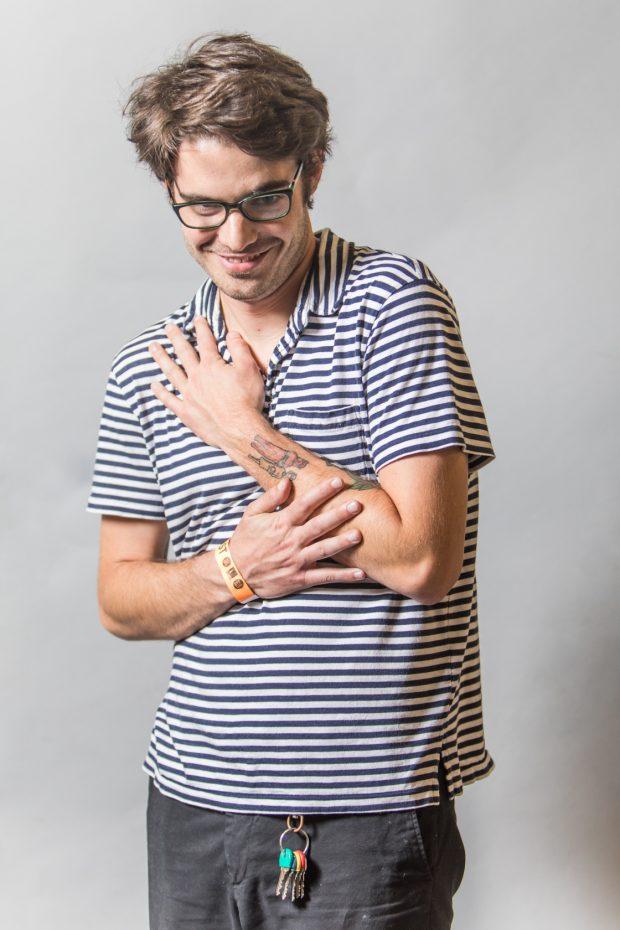
Jake Ewald | photo by Josh Pelta-Heller for WXPN
TK: What’s your favorite venue to play in Philly, do you have one?
JE: Favorite, like, big-boy venue would definitely be Union Transfer, and then favorite not-big-boy venue would currently be Everybody Hits.
TK: Thinking about Philly artists, do you have a favorite that influenced you, or do you have a mentor on the Philly music scene that helped you out?
JE: When me and the Modern Baseball guys first came to college, we definitely got entrenched in like a particular house show scene, and the guy who ended up being our manager, Eric [Osman], he was the most interested in punk and the most social out of all of us. So we would go to shows, and he would have a couple beers and just start talking anyone’s ear off that was in a band to become friends with them and learn about what they were doing – not in like a ladder-climbing way at all, but he was so interested in everything that was going on, and then he would kinda make the friends for us. But yeah, it was just a ton of punk bands that were playing house shows at that time – Spraynard, Everyone Everywhere… We would go see the same bands all the time, we saw Spraynard a lot. There were just so many. It was a cool time.
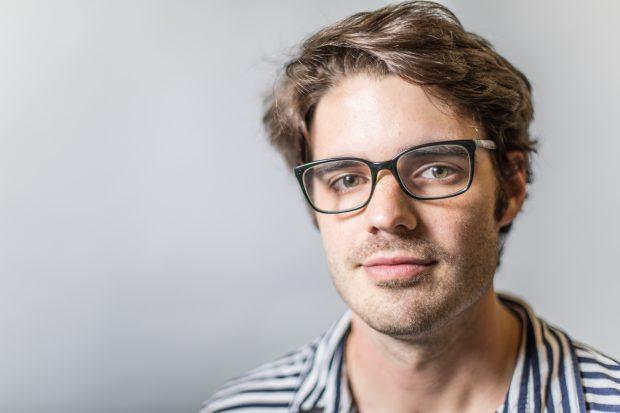
Jake Ewald | photo by Josh Pelta-Heller for WXPN
TK: What do you find most advantageous or beneficial about being an artist in Philly, and what if anything do you find most frustrating about it?
JE: Advantageous is easy. That’s kinda just, really cheap to live here, shows always happening, so it’s relatively easy to play shows and get your music out. And since it’s cheap to live here, you don’t have to work yourself to death, you have time to actually make music. But then…difficult thing would be…I guess, since there is so much happening a lot of the time, it’s easy to get involved in one particular subset of the scene, and go to those shows, every week, and it’s really easy to forget how much other stuff is going on.
Which is not a huge disadvantage. But it does kinda stink if something starts feeling kinda cliquey, within a certain set of shows, or if people start being weird, or if you just start feeling like, this sucks…it’s easy to forget that there is a lot more going on outside this one set of shows. But it’s kinda tough because, since there are so many shows for exactly what you want, it’s easy to fall into having that feel like your whole life, and you feel kinda stuck in there. But that’s kind of just a matter of remembering that there is more stuff out there.
TK: What neighborhoods have you lived in, in Philly, and which did you like and which did you hate?
JE: I’ve lived in University City/Mantua when I was in college, and then I lived in South Philly/Passyunk-area at the end of college. And then I moved to Fishtown, like Kensington – the York/Dauphin stop on the El – after that, and then I moved to West Philly, 52nd and Cedar [Sts.] after that. And now I’m back in Fishtown.
I think overall, my favorite is Fishtown/Kensington, because it feels so much like you’re not totally in the city, you know? You can park your car, and you don’t see everyone you know every time you walk out of the house, so it feels more separated from everything, which I like, personally. But the thing I really like about South Philly/Passyunk-area – it’s really about food. There’s just so much food! And it’s all real restaurants that have been there for like fifty years, and you can get you know, a $4 banh mi and it’s the best banh mi you’ve ever had, whereas everything in Fishtown has been there for one year, and it’s overpriced, and it’s all the same thing and it’s just annoying. But, so, that’s my struggle.
- Jake Ewald | photo by Josh Pelta-Heller for WXPN
- Jake Ewald | photo by Josh Pelta-Heller for WXPN
- Jake Ewald | photo by Josh Pelta-Heller for WXPN
- Jake Ewald | photo by Josh Pelta-Heller for WXPN
- Jake Ewald | photo by Josh Pelta-Heller for WXPN
- Jake Ewald | photo by Josh Pelta-Heller for WXPN
- Jake Ewald | photo by Josh Pelta-Heller for WXPN
- Jake Ewald | photo by Josh Pelta-Heller for WXPN
- Jake Ewald | photo by Josh Pelta-Heller for WXPN
- Jake Ewald | photo by Josh Pelta-Heller for WXPN
- Jake Ewald | photo by Josh Pelta-Heller for WXPN
- Jake Ewald | photo by Josh Pelta-Heller for WXPN
- Jake Ewald | photo by Josh Pelta-Heller for WXPN
- Jake Ewald | photo by Josh Pelta-Heller for WXPN
- Jake Ewald | photo by Josh Pelta-Heller for WXPN
- Jake Ewald | photo by Josh Pelta-Heller for WXPN
- Jake Ewald | photo by Josh Pelta-Heller for WXPN
- Jake Ewald | photo by Josh Pelta-Heller for WXPN
- Jake Ewald | photo by Josh Pelta-Heller for WXPN


















